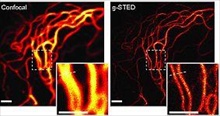Channels
Special Offers & Promotions
License Agreement Between Leica Microsystems, the Max Planck Society and the German Cancer Research Center
 Leica Microsystems has signed an agreement with
the Max Planck Society and the German Cancer Research Center (DKFZ) for the
development of the next generation of super-resolution STED (Stimulated
Emission Depletion) microscopy. This gives Leica Microsystems the license to
develop the new technology, called gated STED, into a commercial product and
put it on the market.
Leica Microsystems has signed an agreement with
the Max Planck Society and the German Cancer Research Center (DKFZ) for the
development of the next generation of super-resolution STED (Stimulated
Emission Depletion) microscopy. This gives Leica Microsystems the license to
develop the new technology, called gated STED, into a commercial product and
put it on the market.Professor Stefan Hell, Director at the Max Planck Institute for Biophysical Chemistry, has taken his idea of STED microscopy a momentous step further with gated STED: The new technology significantly improves the resolution and contrast previously attained with CW-STED (Continuous-Wave Stimulated Emission Depletion) microscopy, while distinctly reducing laser intensity. This enhances photostability as well as live cell capability, substantially extending the range of possible applications. Also, gated STED technology will considerably increase the number of questions that can be addressed with STED fluorescence correlation spectroscopy (STED-FCS). The main application of gated STED FCS will be the observation of molecule movements in the membrane of living cells.
The new product of Leica Microsystems will be launched in the first half of the year 2012. Thanks to Leica Microsystems' modular concept, the Leica TCS SP5 and Leica TCS STED CW confocal systems already on the market can be upgraded with gated STED.
"We're delighted to be able to continue the provenly successful cooperation with the Max Planck Society, its technology transfer organization Max Planck Innovation and the DKFZ with this trailblazing product development," says Dr. Stefan Traeger, Vice President of Leica Microsystems' Life Science Division. "The new gated STED microscope will enable us to further strengthen our technological lead in super-resolution microscopy especially for confocal systems. "
For further information visit www.leica-microsystems.com
Leica Microsystems is a world leader in microscopes and scientific instruments. Founded as a family business in the nineteenth century, the company's history was marked by unparalleled innovation on its way to becoming a global enterprise.
Its historically close cooperation with the scientific community is the key to Leica Microsystems' tradition of innovation, which draws on users' ideas and creates solutions tailored to their requirements. At the global level, Leica Microsystems is organized in four divisions, all of which are among the leaders in their respective fields: the Life Science Division, Industry Division, Biosystems Division and Medical Division.
Leica Microsystems' Biosystems Division, also known as Leica Biosystems, offers histopathology laboratories the most extensive product range with appropriate products for each work step in histology and for a high level of productivity in the working processes of the entire laboratory.
The company is represented in over 100 countries with 12 manufacturing facilities in 7 countries, sales and service organizations in 19 countries and an international network of dealers. The company is headquartered in Wetzlar, Germany.
Media Partners


